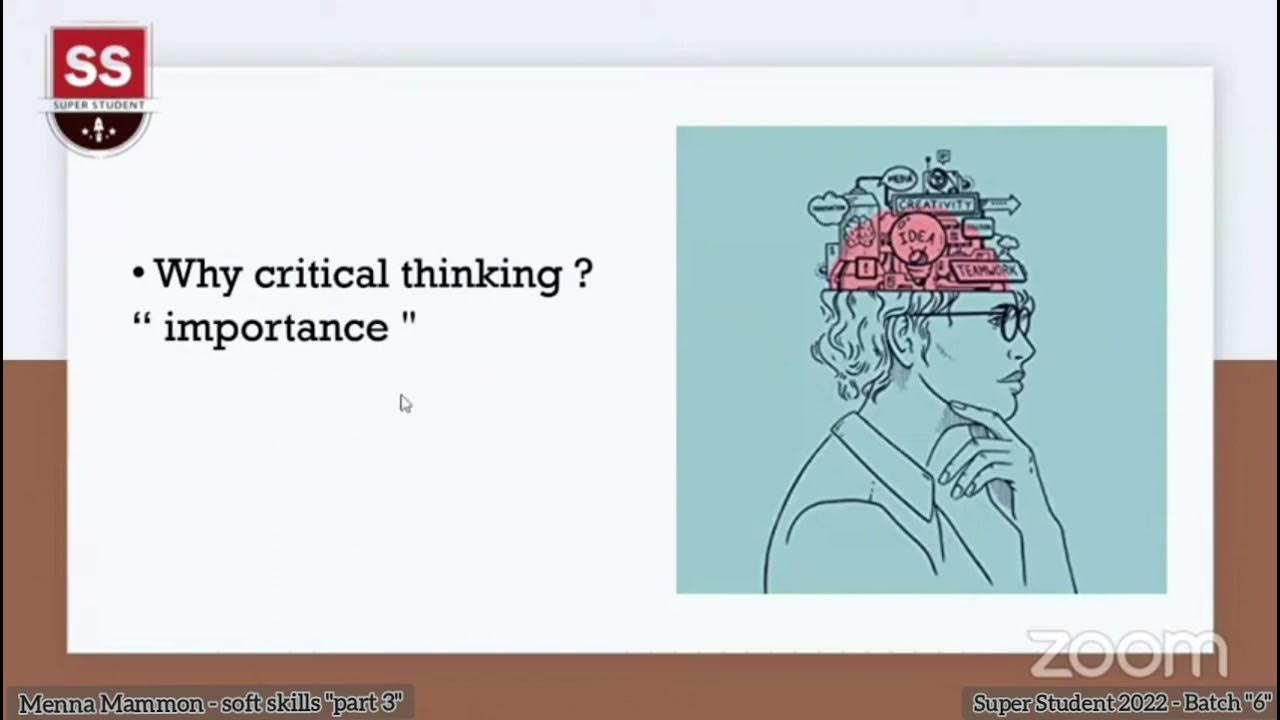Overcoming Critical Thinking Barriers
Summary
TLDRIn this video, the importance of overcoming critical thinking barriers to unlock one’s full potential is explored. The script delves into seven key barriers: egocentric thinking, biased experiences, arrogance and intolerance, schedule pressures, drone mentality, social conditioning, and groupthink. Each barrier is explained with practical strategies for overcoming them, such as embracing empathy, seeking diverse perspectives, practicing humility, managing stress, and challenging societal norms. Viewers are encouraged to reflect on their thinking and make intentional changes to foster better decision-making and personal growth. The video emphasizes that critical thinking is crucial for success in all areas of life.
Takeaways
- 😀 Critical thinking is essential for navigating life's challenges, from everyday decisions to complex issues.
- 😀 Barriers to critical thinking can cloud judgment and hinder decision-making abilities.
- 😀 Egocentric thinking is the first barrier, where focusing only on our own perspective blocks us from considering others' views.
- 😀 Biased experiences, often driven by personal emotions, distort reality and lead to flawed judgments.
- 😀 Arrogance and intolerance prevent us from accepting new ideas, limiting growth and learning.
- 😀 Schedule pressures can lead to rushed decisions, often with negative consequences, but proper planning can help mitigate this.
- 😀 Drone mentality refers to a lack of awareness of new challenges and experiences, stifling personal growth.
- 😀 Social conditioning subtly influences our beliefs and actions, and challenging stereotypes helps broaden our horizons.
- 😀 Groupthink, the tendency to conform to the majority, suppresses independent thinking and critical thought.
- 😀 Overcoming these barriers requires strategies like embracing empathy, humility, and a willingness to learn from diverse perspectives.
- 😀 Unlocking our full potential involves breaking down these critical thinking barriers and embracing continuous growth.
Q & A
What is the primary topic of the video?
-The primary topic of the video is overcoming barriers to critical thinking in order to unlock one's full potential.
Why is critical thinking described as a 'compass'?
-Critical thinking is referred to as a 'compass' because it helps guide individuals through life's challenges, enabling better decision-making in various contexts such as classrooms, boardrooms, and beyond.
What is egocentric thinking and how does it impact decision-making?
-Egocentric thinking refers to being overly focused on one's own narrative, which can lead to ignoring others' viewpoints. This barrier hinders effective decision-making by limiting perspective.
How can empathy help overcome egocentric thinking?
-Empathy can help overcome egocentric thinking by encouraging individuals to value and understand diverse perspectives, allowing for more well-rounded decision-making.
What role do biased experiences play in critical thinking?
-Biased experiences stem from personal emotions and tendencies, distorting one's view of reality. These biases can cloud judgment, making it difficult to think objectively and clearly.
What is the solution to combat biased thinking?
-To combat biased thinking, individuals can seek unfiltered insights from trusted friends or external sources, challenging their own views and gaining alternative perspectives.
How does arrogance and intolerance affect critical thinking?
-Arrogance and intolerance can lead to closed-mindedness, where individuals dismiss ideas that might be better than their own. It stifles growth and limits learning.
How can humility contribute to overcoming arrogance in thinking?
-Humility encourages individuals to acknowledge that growth comes from learning and adapting, rather than always being right. This mindset helps embrace new and better ideas.
What is drone mentality and why is it a barrier to critical thinking?
-Drone mentality refers to the autopilot mode where individuals become comfortable and stop actively engaging with new challenges. It stifles growth and curiosity, preventing individuals from exploring new ideas.
What strategies can be used to break free from drone mentality?
-To break free from drone mentality, individuals should surround themselves with inspiring people and seek out new experiences that ignite curiosity and drive.
How does social conditioning affect the way we think?
-Social conditioning shapes our beliefs and perceptions, often leading to stereotypes and limited perspectives. This can hinder critical thinking by reinforcing biases rather than encouraging open-mindedness.
What is groupthink, and how does it impact critical thinking?
-Groupthink is the phenomenon where individuals conform to the opinions of the group, stifling independent thought. It can limit creativity and prevent the consideration of alternative solutions or ideas.
How can one challenge groupthink in decision-making?
-To challenge groupthink, individuals should question the norm, stand apart when necessary, and uphold their principles, fostering an environment where critical thinking is encouraged.
What is the takeaway message about overcoming barriers to critical thinking?
-The takeaway message is that overcoming barriers like egocentric thinking, bias, arrogance, schedule pressures, drone mentality, social conditioning, and groupthink is crucial for unlocking one's full potential and making better decisions.
Outlines

This section is available to paid users only. Please upgrade to access this part.
Upgrade NowMindmap

This section is available to paid users only. Please upgrade to access this part.
Upgrade NowKeywords

This section is available to paid users only. Please upgrade to access this part.
Upgrade NowHighlights

This section is available to paid users only. Please upgrade to access this part.
Upgrade NowTranscripts

This section is available to paid users only. Please upgrade to access this part.
Upgrade Now5.0 / 5 (0 votes)





